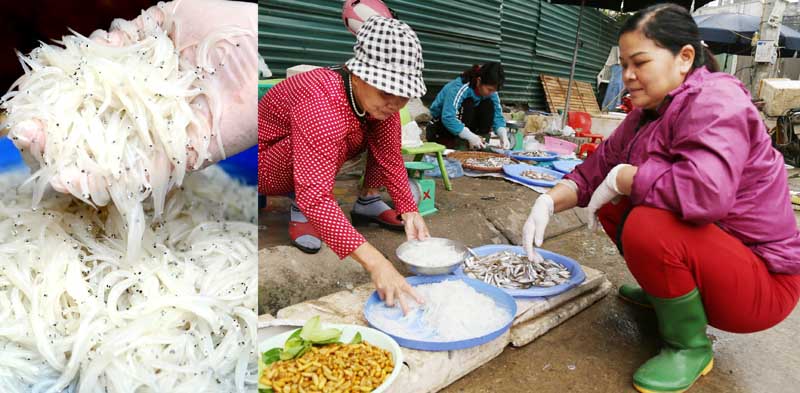
(HBO) In recent years, ‘ngan’ fish in Da river – a species of fish that has a see-through and tiny body like a thread of noodle with the eyes are the only black spots - suddenly becomes famous. It becomes a precious and delicious specialty, making people eat once and want to enjoy again and again.

‘Ngan’ fish is sold in Nghia Phuong market in Hoa Binh city.
This year’s ‘ngan’ fish season came soon. Since
the beginning of March, many boats could purchase the fish. This time started
the new season of the fish so the fish is abundant with high quality.
At the beginning of the season, the fish is
usually sold at a higher price - about over 200,000 VND per kilogramme. By
mid-season, the price drops to only over 100,000 VND per kilogramme. Each kilogramme of ‘ngan’ fish is enough to
cook three different dishes for a meal.
‘Ngan’ fish can be mixed with spices, dill
vegetables, onions and eggs, and meat to make nutrient-richsteamed fish ball. "Ngan’ fish can also be dried or used to make sour
soup.
A number of traders said they sell a lot of
fish to merchants and retailers at markets, and to restaurants. ‘Ngan’ fish is
usually not enough to meet the demand of buyers.
Local fishermen have good sense of fishing to sustainably preserve the aquatic
resources. They usually use handcrafted items such as nets, fishing-baskets or angling
to catch fish, not those that can cause disappearance of the species of fish.
To protect the aquatic resources in a sustainable manner, in May 2018,
the provincial Department of Agriculture and Rural Development asked Hoa Binh’s
localities to have specific measures and activities, including those to reasonably
exploit ‘ngan’ fish through using fishing gears to exploit aquatic products. The
moves aims to avoid affecting natural fish species and those cultivated in
cages by locals, and prevent overexploitation./.
According to data from the Hoa Binh Provincial Party Committee, the industrial production index for the first six months of 2025 is estimated to have increased by 20% compared to the same period last year. This marks the highest year-on-year growth rate for this period since 2020.
In the first six months of 2025, Hoa Binh province’s export turnover was estimated at 1.145 billion USD, marking an 18.11% increase compared to the same period in 2024. Import turnover was estimated at $ 804 million, a 17.15% increase, which helped the province maintain a positive trade balance.
The lives of the ethnic minority farmers in Tan Lac district have gradually improved thanks to the new directions in agricultural production. This is a testament to the collective strength fostered through the professional associations and groups implemented by various levels of the district’s Farmers’ Union.
With the motto the "product quality comes first,” after nearly one year of establishment and operation, Muong village’s Clean Food Agricultural and Commercial Cooperative, located in Cau Hamlet, Hung Son Commune (Kim Boi district), has launched reputable, high-quality agricultural products to the market that are well-received by consumers. The products such as Muong village’s pork sausage, salt-cured chicken, and salt-cured pork hocks have gradually carved out a place in the market and they are on the path to obtaining the OCOP certification.
In the past, the phrase "bumper harvest, rock-bottom prices" was a familiar refrain for Vietnamese farmers engaged in fragmented, small-scale agriculture. But today, a new spirit is emerging across rural areas of Hoa Binh province - one of collaboration, organisation, and collective economic models that provide a stable foundation for production.
Maintaining growing area codes and packing facility codes in accordance with regulations is a mandatory requirement for agricultural products to be eligible for export. Recently, the Department of Agriculture and Environment of Hoa Binh province has intensified technical supervision of designated farming areas and packing facilities to safeguard the "green passport" that enables its products to access international markets.



